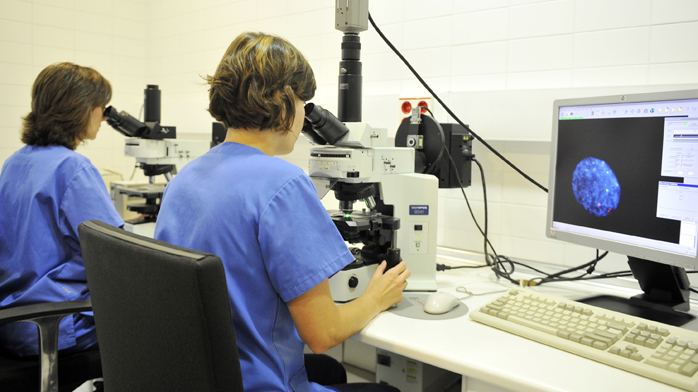Analyses during pregnancy
Pregnancy is simply a physiological state in women, but even so, we need to take care. Analyses and ultrasounds must be performed in order to ensure that the pregnancy ends well

How can we help you?
Non-obligation guidance
Why should a woman have analyses during pregnancy?
The reason for performing blood sample analyses during pregnancy is to detect any possible abnormalities in the mother and, in doing so, avoid any complications that can arise during pregnancy.
Complications can affect both the mother and the foetus’ health and this is why it is important that all pregnancies are monitored appropriately.
From a practical point of view, pregnancies can be split into three terms.
The first term starts with conception and ends in week 12 of pregnancy. The second term begins in week 13 and ends in week 26. The third term extends from week 27 up to childbirth.
The analyses performed during the first term
- A general biochemical analysis. This test is taken on an empty stomach and it gives an indication of the mother’s general state of health at the beginning of the pregnancy. The different tests include one of glucose in the mother’s blood and it is used to rule out possible early gestational diabetes. Others include a serological evaluation of Hepatitis B and C, HIV, syphilis, toxoplasma and rubella. The information that is obtained tells us about the status of the mother's immunity to these microorganisms and it can be used to rule out any infections that could harm the foetus. It is also important to get an indication of what the mother’s iron levels are by measuring ferritin levels. A woman’s requirements increase during pregnancy. At our clinic, we also perform thyroid hormone level tests. Normal levels are needed in order for the foetus to develop correctly.
- Haemogram. This test lets us know if the mother has anaemia or not. If we take into account that sustained low levels of iron during pregnancy can increase the risk of a premature birth and an underweight baby, this information is important.
- Down's syndrome screening. Two parameters are measured in the mother's blood (BHCG and PAPP-A). When analysed in conjunction with an ultrasound scan, we can use this information to calculate the risk of the foetus having Down's syndrome.
- Urine. A urine analysis provides us with information about correct renal function, amongst other things. Culture is performed in order to rule out possible urine infections that the pregnant woman may have but that have not presented any symptoms. It is important to treat any infections of this kind in order to reduce the risk of a premature birth.
Analyses during the second term
- A general biochemical analysis. During this term, this test is much simpler and the analysis includes liver transaminases, uric acid and ferritin levels.
- The O’Sullivan test. Fasting is not necessary for this test. It is performed between weeks 24 and 28 of pregnancy. The pregnant woman drinks a syrup that contains 50 mg of glucose and, one hour later, a blood sample is taken. The test is used to rule out gestational diabetes in the future mother.
- Haemogram. A heamogram is also performed during this term in order to see if the pregnant woman has developed iron-deficiency anaemia or to keep an eye on this condition if it was already detected during the first term.
- Urine. A urine culture is also completed in this term and the aim is the same as in the previous one.
Analyses during the third term
- A general biochemical analysis. This analysis is very similar to the one performed in the first term, plus a control of cholinesterase levels in the mother's blood in case a caesarean section is necessary.
- Haemogram. It is performed for the same reasons as in previous terms.
- Urine. It is performed for the same reasons as in previous terms.
- Coagulation analysis. This test is necessary in case a caesarean section needs to be performed.
- Streptococcus agalactiae. Presence of this microorganism in the pregnant woman’s vagina and rectum is controlled between weeks 35 and 37 of pregnancy. If this bacterium is detected, the mother has to take an antibiotic when giving birth so that the infection is not passed on to the baby.